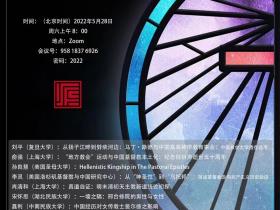國際學術研討會徵稿通知
再造通儒: 十八世紀中國的西學與儒學
2016 年 1 月 29-31 日 香港大學中文學院
十八世紀是中西文化交流史上的一個關鍵時期。從晚明開始,入華天主教傳教士傳播天主教 信仰,並以西學之名廣泛介紹西方科技文化成果。雖然清廷厲行禁教政策,知識傳播的進程 依然持續。另一方面,明清之際的儒家學者擺脫了宋明儒學的影響,提倡一種新的以文獻考 據、訓詁、校勘為重心的治學模式,通常稱為考據學或漢學。在過去的幾十年,這兩種潮流 之間的複雜關係已成為一個學界特別關注的挑戰性課題。然而,在西學是否影響了或在哪些 方面、多大程度上影響了清代儒學的問題上,學者常常持不同甚至截然相反的觀點。為推動 對這一課題更廣泛的研究、合作,香港大學中文學院將於 2016 年 1 月 29-31 日舉辦一場國際 學術研討會。會議將為深入的學術探索和交流提供一個学术平台,考察以下重要議題:
1. 自稱西士的天主教傳教士是否向中國人全面介紹了西學的最新成就?在傳播過程中,他 們策略性地保留或篩除了哪些元素?出於何種原因?
2. 清代學者如何看待儒學自身的發展?他們對西學作出哪些回應?不同學派之間是否存在 差異?流行一時的“西學中源”說是否隱含著文化意識形態的因素?
3. 考據學在明清之際興起的過程中,代表性儒家天主教徒扮演了何種角色?他們從天主教 角度提倡實用之學,重新解讀儒家經典文本,是否直接或間接地呼應了儒家學者孜孜以求 的通儒理想?
4. 學界所謂的“早期現代性”是儒學自身演進的結果,還是與西學傳播有關?用何種理論 框架和方法能夠更有效地解釋清中葉儒學的發展及西學在儒學景觀中的地位?
主辦者誠邀中國思想史、科技史、明清社會史、宗教研究、文化研究等領域的學者參加會議, 針對上述議題發表他們近期的研究成果,也期望與會者利用新發現的資料和新式研究法討論 這一課題。
會議所有場次都在同一間會議室內進行。與會者可用中文或英文發表論文。每人發言以二十 分鐘為限。
主辦方將負責 1 月 29 至 31 日的食宿,其他旅行費用請與會者自理。
投稿事宜:請於 2015 年 8 月 31 日前提交論文摘要(中文或英文,不超過五百字,MS Word 文檔)連同個人簡歷一份(含通訊地址和電話/傳真號碼),以電郵方式寄至 RES2016@hku.hk。 如獲接受,請於 12 月 31 日前提交論文全文,會議籌備組收到論文之後,將發出正式邀請函。
如有任何查詢,請致詢會議聯絡人宋剛博士(RES2016@hku.hk)。
CALL FOR PAPERS
The Remaking of Erudite Scholars:
Western Knowledge and Confucian Learning in Eighteenth-Century China
January 29-31, 2016 University of Hong Kong
The eighteenth century was one of the pivotal moments in the cultural encounters between China and Europe in modern history. Since the late Ming period, Catholic missionaries had made great efforts to introduce the Christian faith along with a broad range of Western cultural achievements in the name of Xixue 西學, or Western Learning. Their extensive knowledge transmission continued despite the Qing government’s prohibition of Christianity during the eighteenth century. On the other hand, Chinese scholars since the Ming-Qing transition moved away from the influence of Song-Ming Neo-Confucians and promoted a new evidence-based mode of learning, commonly called Kaojuxue 考據學 (Evidential Studies) or Hanxue 漢學 (Han Studies). The complex relation between these two trends has been an intriguing yet challenging subject in the past decades. However, modern scholars often take different or even conflicting views on whether, or to what extent, Xixue exerted any impacts on the Qing Confucian intelligentsia. To achieve a greater scale of collaborative research on this subject, the School of Chinese at the University of Hong Kong will host an international symposium on January 29-31, 2016. It provides a platform for further scholarly explorations and exchanges on the following key issues:
1. Did the Catholic missionaries, who called themselves Xishi 西士 (Western scholars), introduce a full body of up-to-date Western knowledge to the Chinese? What components did they strategically remain or filter out in the knowledge transmission process? For what reasons?
2. How did Qing scholars treat the recent developments in Confucianism? How did they respond to Xixue? Did major Confucian schools hold different views? Was there any ideological implication for the popular claim Xixue Zhongyuan 西學中源, or Western Learning of a Chinese origin?
3. What kind of role did the leading Confucian converts play in the rise of evidential scholarship? Did their studies on practical knowledge and Christian re-interpretations of Confucian classics directly or indirectly echo the ideal of tongru 通儒, or erudite scholars, among many mid-Qing Confucians?
4. Is the so-called “early modernity” a result of the evolution within Confucianism? Or, does it have any relation with Xixue? What frameworks and approaches may be adopted to more efficiently explain the development of Mid-Qing Confucianism and the position of Xixue in the Confucian intellectual landscape?
We welcome paper submissions from scholars in Chinese intellectual history, history of Chinese sciences, Ming-Qing social history, religious studies, and cultural studies, who will contribute most recent research on the above key issues. We also encourage participating scholars to make use of newly discovered sources and innovative methods to explore the subject.
All symposium sessions will be held in one conference room. Participants may present their papers either in English or in Chinese. Each presentation is given 20 minutes.
Accommodation and meal will be provided for participants whose papers are selected for presentation.
Submissions: Please submit a proposal of no more than 500 words (either in English or in Chinese, MS Word document preferred) and a one-page academic CV (including mailing address and phone/fax contacts) via email to RES2016@hku.hk by August 31, 2015. If selected, full papers should be submitted by December 31, 2015.
For any inquires, please contact Dr. Song Gang (RES2016@hku.hk).
继续阅读







评论